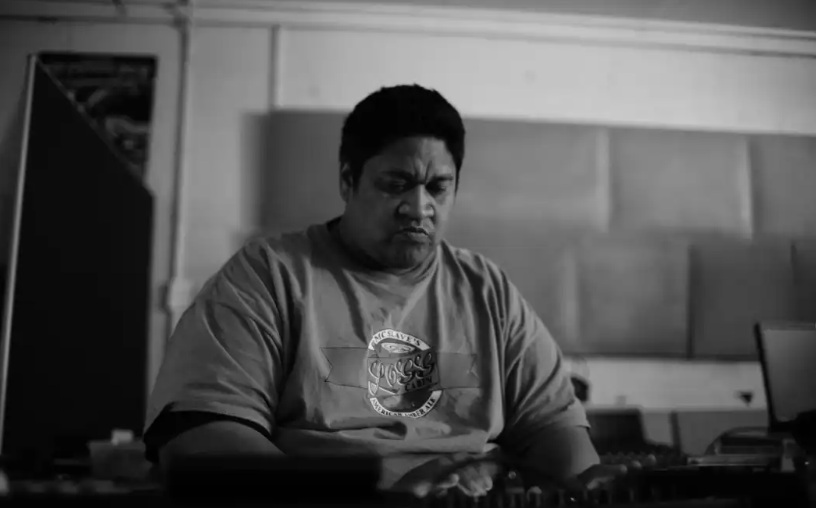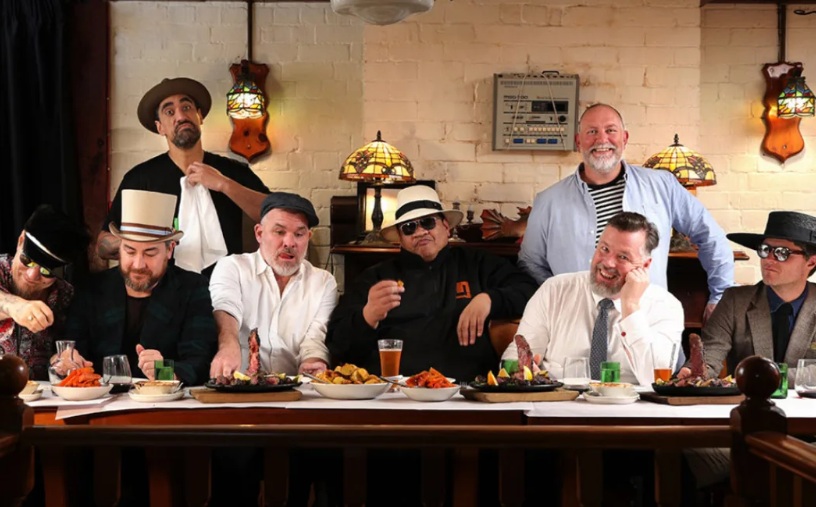
Christopher Ta'aloga Faiumu – better known simply as Mu – died suddenly on Wednesday.
He was the founder and creative force behind Fat Freddy’s Drop, one of the most successful bands to come out of Aoteaora.
For two and a-half decades he was their producer and their pulse.
Though neither a singer nor a soloist, his presence was intrinsic to the band. That’s not just because of the imposing figure he cut on stage as he hunched over his MPC sampler, but also because Fat Freddy’s songs were built on the musical foundations he put down.
Though the group achieved massive popularity, not just in this country but throughout Australasia, Europe and North America, Fat Freddy’s Drop never signed to a major label, instead running the group as an independent collective managed by Mu’s partner Nicole Duckworth.
The independent spirit carried over to their music. Never consciously commercial, their music grew organically out of jam sessions, often based around a rhythmic pattern or bassline Mu had created on his Akai MPC sampler. Yet their performances were like an invitation to be part of a communal experience, and people would flock to see them at concerts and festivals all over the world. In London they sold out the O2 Academy at shows in 2014 and again in 2018.
Chris grew up in Wainuiomata, the fifth child of Samoan immigrant parents. An older sister had a collection of 70s soul records which he would later come to treasure, but his tastes were initially formed by his brothers, who were into rock – Santana, Hendrix, Neil Young.
His parents had made a conscious decision to give their children “an education outside Wainuiomata”, and his brothers were sent to Te Aute College in Hawkes Bay, but Chris opted to go to Scots College in Wellington because it was closer to home. There he found he was one of the few Samoan students.
“I’m sure I freaked them out”, he recalled. “One, I was Samoan and brown, and two, I was also much larger than everyone else, though a few rugby coaches there embraced that.”

After completing school he spent a year in the army, thinking he might become an officer, but though he “had a ball… abseiling out of a helicopter and blowing up a tank” it became apparent that neither he nor the army had found what they were looking for.
He then enrolled in a Bachelor of Science at Victoria University, but walking between lectures his curiosity was piqued by music blasting out of a room on the top floor of the Student Union Building. This, he discovered, was the studio of the campus station Radio Active. When he summoned the courage to ask the station manager about the possibility of doing some deejaying he was asked, “Well, what are you doing right now?" Five minutes later he was on the air.
By the late 80s he had accumulated a formidable record collection and was being asked to deejay at parties. In the 90s he became part of the Funky Monks, a DJ collective specialising in soul, funk and hip-hop. Around the same time he helped form the Roots Foundation, another group of deejays with a reggae focus. It was through dub reggae that he began to develop ideas and skills in the production and manipulation of sound.
Deejaying in Wellington bars like Bodega and the Matterhorn led to late night jam sessions with live musicians, Mu supplying the beats. Gradually he progressed from playing beats directly off vinyl to producing his own rhythms on an Akai Music Production Centre (MPC) sampler. Out of these jams grew the sprawling and amorphous Bongmaster, which in turn spawned Fat Freddy’s Drop which he formed with singer Dallas Tamaira and trumpeter Toby Laing.
Their first album ‘Live At The Matterhorn' was simply a live show recorded to minidisc, given a little editing by Mu. It immediately sold 9000 copies.
Their debut studio album ‘Based On A True Story’, released in 2005, was a more sophisticated affair, recorded at The Drop, the studio Mu had built in his Lyall Bay home. The album went gold immediately, became the longest album by a New Zealand act to stay at number 1 where it spent 10 weeks, and the group cleaned up at that year’s New Zealand Music Awards.
A 12-inch single, ‘Midnight Marauders’ (credited to Joe Dukie and DJ Fitchie, Dallas and Mu’s stage names), had already built interest in Europe, where the group toured for the first time in 2003, and the band began a schedule of making records and touring in both Australasia and Europe which would continue for the next 20 years. They developed a distinctive and original style that drew on reggae, funk, jazz and electronica but also reflected the group’s Pacific origins.
Mu had friends and fans all over the world, but his home base continued to be on Wellington’s south coast where he lived with Nicole and their daughter Mia. Like the music he made, he had a deep sense of roots, and he always came home.













